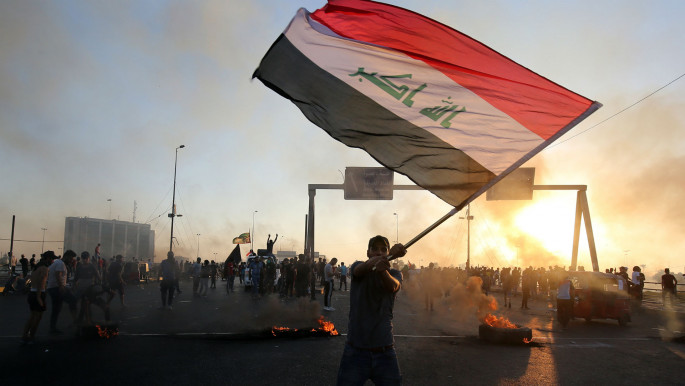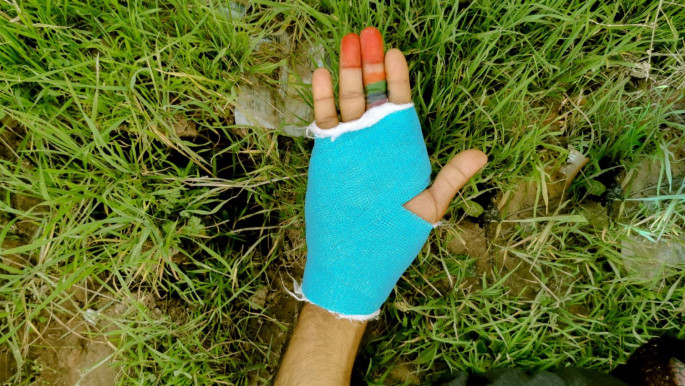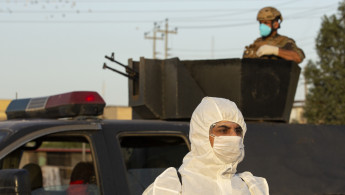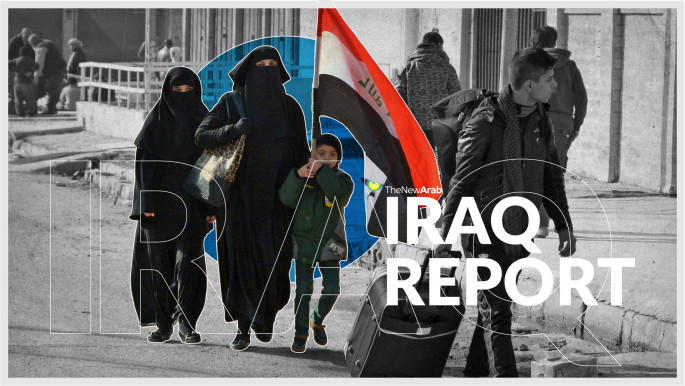The Iraq Report: Political paralysis slows fight against coronavirus amid economic woes
Zurfi faces calls to stand down and to allow someone else to form a new government, but has so far resisted these attempts to oust him and is still seeking to build a consensus government with him at its head.
However, even if he should succeed in doing so, he will take charge of a government that is not only notoriously divided, but one that is facing an economic crisis that has been made worse by an ongoing oil price dispute between Russia and Saudi Arabia, driving oil prices down and crippling Iraq's profits.
Iraq's governance woes have further exacerbated the country's fightback against the novel coronavirus pandemic as both Iraqis and militia groups close to the government flout the authorities' advice to stay away from crowded spaces.
Not only have Iraqis refused to stop gathering for religious observances, but many conservatives have also refused to quarantine sick women in their families on grounds of having their honour besmirched, leading to a complicating of a dangerous public health situation.
Government paralysis exposes fissures between elites
Prime minister-designate Adnan al-Zurfi continues to face an uphill battle to form a government after he was asked to form a new cabinet unilaterally by President Barham Salih more than a week ago.
He faces opposition from not only fellow Iraqi politicians and influential Shia clerics, but also from the population itself who have been protesting the political process since October last year.
 |
Prime minister-designate Adnan al-Zurfi continues to face an uphill battle to form a government after he was asked to form a new cabinet unilaterally by President Barham Salih |  |
Zurfi, a former governor of the Shia holy city of Najaf in southern Iraq, has been accused by his fellow Shia Islamists within the Iraqi parliament of having been corrupt during his governorship of the shrine city.
Zurfi denies the allegations, but his dual Iraqi-American citizenship has raised doubts about his loyalties.
The Conquest coalition led by several high profile Iran-backed Shia Islamists and the Sairoun bloc headed by powerful Shia cleric Moqtada al-Sadr had both failed to nominate a candidate, while the Conquest coalition rejected Zurfi's nomination outright and have pledged to topple him if he puts any new cabinet to an approval vote within the 30 day time allotted.
Zurfi is a member of the Victory Alliance headed by former prime minister Haider al-Abadi who led the government during Iraq's war against the Islamic State group from 2014 before losing the elections in 2018.
 |
|
| Read more: The Iraq Report: Iraq still in chaos 17 years after US invasion |
The prime ministerial hopeful is seen as being too close to the United States and therefore pro-Iran politicians do not have any faith in him as being a candidate who will further their interests. His American citizenship is frequently brought up in discussions about his leadership.
Zurfi was appointed to the governorship of Najaf by the governor of the US occupation authorities, Paul Bremmer, in 2004. During that time, he faced off against Sadr's Mahdi Army militia, an action that has not endeared him to the militant cleric whose militia was heavily involved in sectarian killing campaigns against thousands of Iraq's Sunni Arabs.
Protesters have also taken to the streets of Iraqi cities carrying portraits of Zurfi that had been defaced with red crosses to show their disapproval of his appointment.
Speaking to The New Arab, one protester, Abbas Fadel, said: "What is the difference between him and the others? He comes from [former Prime Minister Haider] Abadi's bloc and was governor of Najaf."
"There is no difference between him and his loyalties to America and other candidates who are loyal to Iran. Where are those who are loyal to Iraq?"
Read more: The Iraq Report: An outbreak of virus and violence
Zurfi has pledged to hold early elections if his cabinet is approved, and has also stated that he will do more to challenge the coronavirus pandemic and the economic concerns faced by Iraqis partially as a result of corruption.
However, these promises have been made by other former prime ministers and nothing had been achieved, so it remains to be seen whether the Iraqi public will warm to him, but all indications so far suggest that they will not tolerate his premiership anymore than they tolerated former Prime Minister Adel Abdul Mahdi's.
Oil price war ravages Iraqi economy
Saudi Arabia's continued oil price war with Russia appears to be poised to cripple the Iraqi economy as Riyadh shows no sign in letting up on oil output to drive down prices.
Global oil prices have fallen to record lows of as little as $25 per barrel, halving the market value of the valuable fossil fuel from what it was just a couple of months ago. The glut in oil markets stems from a dispute between Riyadh and Moscow over oil production where Saudi Arabia had originally planned on increasing, and not decreasing, prices.
 |
Iraq is now paying the price of corruption as they did not buttress their economy when oil prices were high, instead preferring to bolster elites' patronage networks that have siphoned hundreds of billions from the Iraqi economy |
 |
Russia opposed Saudi Arabia's moves to slash oil output to increase global prices at a meeting of the OPEC oil cartel earlier this month. In retaliation, Riyadh pledged to increase production by 2.6 millions barrels per day by April this year, with the intent of swallowing Moscow's market share and forcing the Russians to come back to the table.
However, Saudi's moves are not only likely to harm Russia, but also its Iraqi neighbour to the north.
Reports indicate that, at current levels, Iraq will be unable to maintain payroll for the public sector – Iraq's largest employer – and it will similarly be unable to pay pensions.
Despite being one of the most oil-rich countries in the world, Iraq's production, refinery, and export capabilities are outdated and have been devastated by decades of conflict. The country also has no other economic products it can export and is heavily reliant on profits from oil sales.
Even if Iraq attempted to cut its own production to stabilise prices, Saudi Arabia's oil reserves and production capacity is so enormous that it will dwarf any Iraqi attempts. Such a cut in production will also cripple Iraqi coffers as it would reduce its sales.
 |
|
| Read more: Saudi Arabia's flooding of the oil market could spell disaster for Iraq |
Iraq is now paying the price of corruption as they did not buttress their economy when oil prices were high, instead preferring to bolster elites' patronage networks that have siphoned hundreds of billions from the Iraqi economy since the US-led invasion in 2003.
Iraq has faced a similar crisis in oil prices before. Following the Iran-Iraq War that concluded in 1988, the Iraqi government was faced with a war-ravaged economy and its recovery plans were stumped when Kuwait, the United Arab Emirates, and other oil-rich Arab countries increased oil production in excess of OPEC quotas to drive oil prices down and to keep Iraq in debt.
Read more: Honour infects: Iraqi families 'refuse quarantine' for coronavirus-positive daughters
This precipitated the Gulf War and Saddam Hussein's decision to invade Kuwait in 1990, a calamitous decision that itself led to an American-led intervention and the imposition of a deadly sanctions regime that killed half a million Iraqi children by 1996 alone.
It is nigh on impossible that Iraq will go to war over this current oil price war as it lacks the military capabilities to prosecute such a war. Instead, Baghdad will be forced to attempt to absorb these losses by taking on ever more debt and this will perpetuate Iraq's economic woes for years to come.
Coronavirus risk continues to mount
Conservative and largely Shia Iraqis have flouted government curfews imposed to stem the coronavirus pandemic, recent reports show.
Tens of thousands of Iraqi Shias turned out to commemorate a revered holy figure in Baghdad's Kadhimiyyah district last Saturday, causing concern amongst health officials who have been advising Iraqis not to mix in large numbers for fear of mass transmission of the Covid-19 virus.
 |
Not only have Iraqis refused to stop gathering for religious observances, but many conservatives have also refused to quarantine sick women in their families on grounds of having their honour besmirched |  |
The number of pilgrims has been massively reduced compared to previous years, largely because the vast majority of them come from neighbouring Iran that has been hit by one of the worst outbreaks of the virus in the world today.
Millions of pilgrims would visit the shrine of Imam al-Kadhim who died in the 8th century and would kiss the mausoleum housing his remains. However, Iraqi officials prevented pilgrims from doing so this year after there were cases of coronavirus spreading in shrine cities due to this practice.
Conservatives have also refused to allow coronavirus-positive female relatives from being quarantined and treated over fears it would bring "dishonour" and "shame" on the families.
Doctors in Baghdad sought to quarantine a woman who had tested positive for the virus last week, but her family intervened and removed her from medical care facilities. The family considered the quarantine to be "dishonourable" as the woman would have had to live outside the family home without a male chaperone and guardian present.
 |
|
| Read more: The LGBT activists on the frontline of Iraq's revolution |
Ali Al-Bayati, a member of the Iraqi High Commission for Human Rights, confirmed the existence of cases where families refused to let hospitals quarantine their daughters to preserve their "honour", according to reports.
Al-Bayati added that some families have even organised demonstrations outside hospitals that quarantine coronavirus patients.
Iraqi social media users have condemned the trend, with some using an Arabic-language hashtag that translates to "epidemic of ignorance".
But allegations of ignorance were not only levelled at the Iraqi public, but senior Shia religious and political figures.
Moqtada al-Sadr, leader of the powerful Sairoun coalition, blamed the coronavirus pandemic on homosexuality, saying the actions of many governments around the world to legalise same-sex marriage had caused the virus to be a "message from Heaven".
"One of the most egregious things that have caused this epidemic is the legalising of same-sex marriage," the prominent Shia cleric said in a tweet.
"I call on all governments to repeal this [same-sex marriage] law immediately and without any hesitation," Sadr said.
Sadr has a history of targeting homosexuals and trans people in Iraq.
In 2009, Human Rights Watch accused militants under the command of Sadr of targeting and killing gay men in several attacks.
"Murders are committed with impunity, admonitory in intent, with corpses dumped in garbage or hung as warnings in the street," the human rights group said at the time.



![President Pezeshkian has denounced Israel's attacks on Lebanon [Getty]](/sites/default/files/styles/image_684x385/public/2173482924.jpeg?h=a5f2f23a&itok=q3evVtko)



 Follow the Middle East's top stories in English at The New Arab on Google News
Follow the Middle East's top stories in English at The New Arab on Google News


